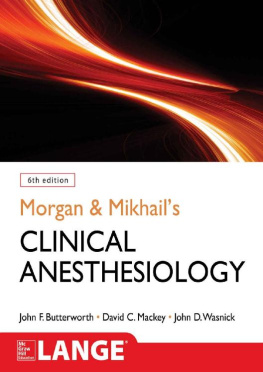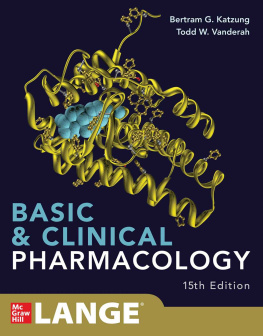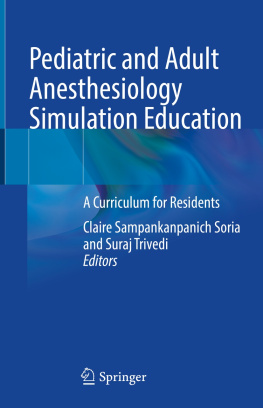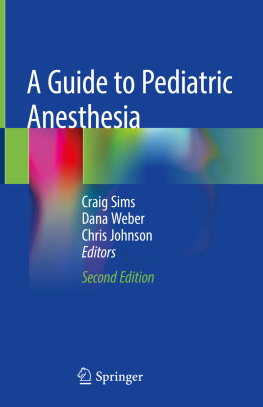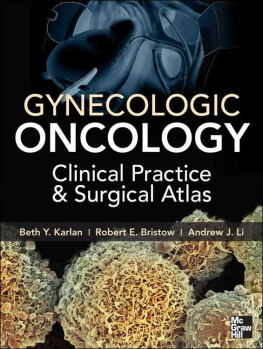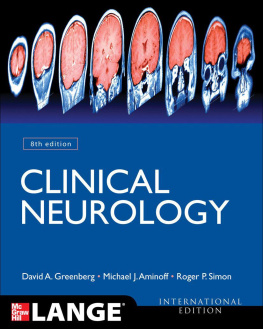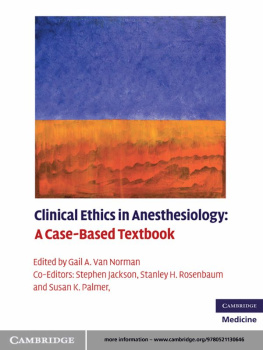
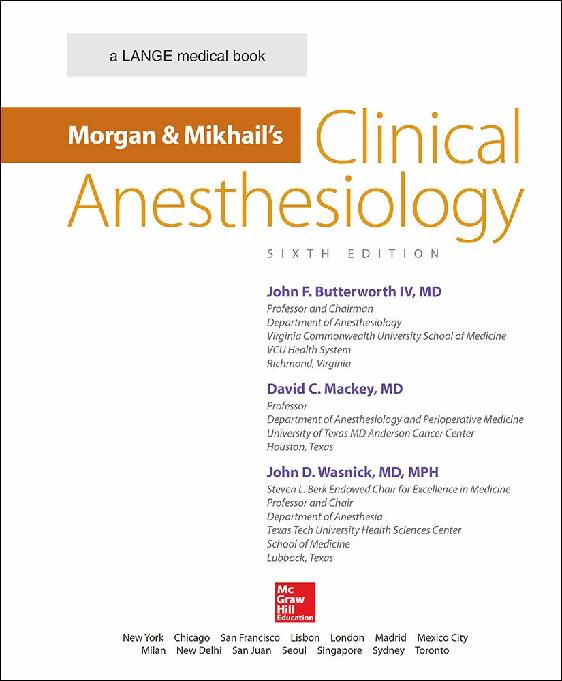
Copyright 2018 by McGraw-Hill Education. All rights reserved. Except as permitted under the United States Copyright Act of 1976, no part of this publication may be reproduced or distributed in any form or by any means, or stored in a database or retrieval system, without the prior written permission of the publisher.
ISBN: 978-1-25-983443-1
MHID: 1-25-983443-3
The material in this eBook also appears in the print version of this title: ISBN: 978-1-25-983442-4,
MHID: 1-25-983442-5.
eBook conversion by codeMantra
Version 1.0
All trademarks are trademarks of their respective owners. Rather than put a trademark symbol after every occurrence of a trademarked name, we use names in an editorial fashion only, and to the benefit of the trademark owner, with no intention of infringement of the trademark. Where such designations appear in this book, they have been printed with initial caps.
McGraw-Hill Education eBooks are available at special quantity discounts to use as premiums and sales promotions or for use in corporate training programs. To contact a representative, please visit the Contact Us page at www.mhprofessional.com.
Notice
Medicine is an ever-changing science. As new research and clinical experience broaden our knowledge, changes in treatment and drug therapy are required. The authors and the publisher of this work have checked with sources believed to be reliable in their efforts to provide information that is complete and generally in accord with the standards accepted at the time of publication. However, in view of the possibility of human error or changes in medical sciences, neither the authors nor the publisher nor any other party who has been involved in the preparation or publication of this work warrants that the information contained herein is in every respect accurate or complete, and they disclaim all responsibility for any errors or omissions or for the results obtained from use of the information contained in this work. Readers are encouraged to confirm the information contained herein with other sources. For example and in particular, readers are advised to check the product information sheet included in the package of each drug they plan to administer to be certain that the information contained in this work is accurate and that changes have not been made in the recommended dose or in the contraindications for administration. This recommendation is of particular importance in connection with new or infrequently used drugs. In this publication we use the terms female and male in 3
accordance with the guidelines established by the World Health Organization. Specifically, references to female and male are based on the anatomy of the reproductive systems, which define humans as biologically female or male.
TERMS OF USE
This is a copyrighted work and McGraw-Hill Education and its licensors reserve all rights in and to the work. Use of this work is subject to these terms. Except as permitted under the Copyright Act of 1976 and the right to store and retrieve one copy of the work, you may not decompile, disassemble, reverse engineer, reproduce, modify, create derivative works based upon, transmit, distribute, disseminate, sell, publish or sublicense the work or any part of it without McGraw-Hill Educations prior consent. You may use the work for your own noncommercial and personal use; any other use of the work is strictly prohibited.
Your right to use the work may be terminated if you fail to comply with these terms.
THE WORK IS PROVIDED AS IS. McGRAW-HILL EDUCATION AND ITS
LICENSORS MAKE NO GUARANTEES OR WARRANTIES AS TO THE
ACCURACY, ADEQUACY OR COMPLETENESS OF OR RESULTS TO BE
OBTAINED FROM USING THE WORK, INCLUDING ANY INFORMATION
THAT CAN BE ACCESSED THROUGH THE WORK VIA HYPERLINK OR
OTHERWISE, AND EXPRESSLY DISCLAIM ANY WARRANTY, EXPRESS OR
IMPLIED, INCLUDING BUT NOT LIMITED TO IMPLIED WARRANTIES OF
MERCHANTABILITY OR FITNESS FOR A PARTICULAR PURPOSE. McGraw-Hill
Education and its licensors do not warrant or guarantee that the functions contained in the work will meet your requirements or that its operation will be uninterrupted or error free.
Neither McGraw-Hill Education nor its licensors shall be liable to you or anyone else for any inaccuracy, error or omission, regardless of cause, in the work or for any damages resulting therefrom. McGraw-Hill Education has no responsibility for the content of any information accessed through the work. Under no circumstances shall McGraw-Hill Education and/or its licensors be liable for any indirect, incidental, special, punitive, consequential or similar damages that result from the use of or inability to use the work, even if any of them has been advised of the possibility of such damages. This limitation of liability shall apply to any claim or cause whatsoever whether such claim or cause arises in contract, tort or otherwise.
Contents
Charles E. Cowles, Jr., MD, MBA, FASA
10 Analgesic Agents
11 Neuromuscular Blocking Agents
12 Cholinesterase Inhibitors & Other Pharmacological Antagonists to
Neuromuscular Blocking Agents
13 Anticholinergic Drugs
14 Adrenergic Agonists & Antagonists
15 Hypotensive Agents
16 Local Anesthetics
17 Adjuncts to Anesthesia
18 Preoperative Assessment, Premedication, & Perioperative Documentation
19 Airway Management
20 Cardiovascular Physiology & Anesthesia
21 Anesthesia for Patients with Cardiovascular Disease
22 Anesthesia for Cardiovascular Surgery
23 Respiratory Physiology & Anesthesia
24 Anesthesia for Patients with Respiratory Disease
25 Anesthesia for Thoracic Surgery
26 Neurophysiology & Anesthesia
27 Anesthesia for Neurosurgery
28 Anesthesia for Patients with Neurological & Psychiatric Diseases 29 Anesthesia for Patients with Neuromuscular Disease
30 Kidney Physiology & Anesthesia
31 Anesthesia for Patients with Kidney Disease
32 Anesthesia for Genitourinary Surgery
33 Hepatic Physiology & Anesthesia
Michael Ramsay, MD, FRCA
34 Anesthesia for Patients with Liver Disease
Michael Ramsay, MD, FRCA
35 Anesthesia for Patients with Endocrine Disease
36 Anesthesia for Ophthalmic Surgery
37 Anesthesia for OtolaryngologyHead & Neck Surgery
38 Anesthesia for Orthopedic Surgery
Edward R. Mariano, MD, MAS
39 Anesthesia for Trauma & Emergency Surgery
Brian P. McGlinch, MD
40 Maternal & Fetal Physiology & Anesthesia
Michael A. Frlich, MD, MS
41 Obstetric Anesthesia
Michael A. Frlich, MD, MS
42 Pediatric Anesthesia
43 Geriatric Anesthesia
44 Ambulatory & NonOperating Room Anesthesia
45 Spinal, Epidural, & Caudal Blocks
46 Peripheral Nerve Blocks
Sarah J. Madison, MD and Brian M. Ilfeld, MD, MS (Clinical Investigation)
47 Chronic Pain Management
Bruce M. Vrooman, MD, MS, FIPP and Richard W. Rosenquist, MD
48 Enhanced Recovery Protocols & Optimization of Perioperative Outcomes
Gabriele Baldini, MD, MSc and Timothy Miller, MB ChB FRCA
49 Management of Patients with Fluid & Electrolyte Disturbances
50 AcidBase Management
51 Fluid Management & Blood Component Therapy
52 Thermoregulation, Hypothermia, & Malignant Hyperthermia
53 Nutrition in Perioperative & Critical Care
54 Anesthetic Complications
55 Cardiopulmonary Resuscitation
Next page
